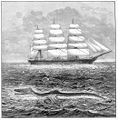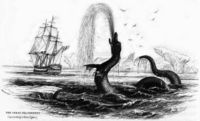Royal Navy: No Easy Access To Files On Sea Serpents.
Posted by: Loren Coleman on May 16th, 2010

No Archive on Sea Monsters: Navy
Sunday 16th May 2010
The Royal Navy may hold records about possible sea monsters but it does not collect them centrally, it has been revealed.
Sailors can note unusual sightings on the ocean waves in their ship’s logs, the Navy said.
But they are not required to do so and none of the information is assembled in a central archive devoted to sea monsters.
Any sightings of strange marine animals reported to the Navy by the public are passed on to the UK Hydrographic Office, which provides charts and other navigational services for mariners.
Details of the Navy’s policy on giant creatures of the deep emerged in response to a Freedom of Information (FoI) request.
A marine biologist inquired whether the Ministry of Defence held records about “abnormally large or dangerous sea monsters hundreds of metres under the sea” that had not been revealed to the public.
In reply an official wrote: “The RN (Royal Navy), and MoD in general, does not maintain any form of central repository of information purely devoted to sea monsters.
“Personnel might be inclined to record unusual sightings in ship’s logs but there is, as far as we know, no actual requirement for them to do so, and it would be beyond the resource constraints of an FoI request to check every line of every RN log book for any such references since 2005.
“However, the RN does invite people to report sightings of marine mammals, and it’s possible this could include unusual sightings.
“These are forwarded to the UK Hydrographic Office at Taunton.”

Appreciation to several people who alerted us to this or related news items.
About Loren Coleman
Loren Coleman is one of the world’s leading cryptozoologists, some say “the” leading living cryptozoologist. Certainly, he is acknowledged as the current living American researcher and writer who has most popularized cryptozoology in the late 20th and early 21st centuries.
Starting his fieldwork and investigations in 1960, after traveling and trekking extensively in pursuit of cryptozoological mysteries, Coleman began writing to share his experiences in 1969. An honorary member of Ivan T. Sanderson’s Society for the Investigation of the Unexplained in the 1970s, Coleman has been bestowed with similar honorary memberships of the North Idaho College Cryptozoology Club in 1983, and in subsequent years, that of the British Columbia Scientific Cryptozoology Club, CryptoSafari International, and other international organizations. He was also a Life Member and Benefactor of the International Society of Cryptozoology (now-defunct).
Loren Coleman’s daily blog, as a member of the Cryptomundo Team, served as an ongoing avenue of communication for the ever-growing body of cryptozoo news from 2005 through 2013. He returned as an infrequent contributor beginning Halloween week of 2015.
Coleman is the founder in 2003, and current director of the International Cryptozoology Museum in Portland, Maine.










The lack of a central collection by the Royal Navy concerning Sea Serpents could be the result of funding and time constraints. It could also be the lack of political will to monitor such reports. According to its official website:
“The Naval Service is essential for ensuring the long term security of our national and global interests by :
Defending UK citizens, territory and trade worldwide. Deterring threats to UK peace and prosperity. Defeating any hostile acts against the nation.This is best achieved by a Naval Service that is deployed.Having established why we have a navy, lets look at what we do:
Ready to fight:
The Royal Navy and Royal Marines are ready to fight and win in combat at sea and from the sea. Preventing conflict
The Royal Navy and Royal Marines show power and influence to support national aims and to prevent conflict by taking action to reassure others in times of crisis. Security at sea
The Royal Navy and Royal Marines work with international partners to provide security on the high seas where our interests need protection. Working with international partners
The Royal Navy and Royal Marines promote stable and co-operative relationships with nations around the world, those who are friendly and those more neutral. Disaster relief
The Royal Navy and Royal Marines provide humanitarian aid and relief from the sea. Significance to UK economy
The Royal Navy and Royal Marines contribute to the stability, economic growth and development of the UK. ”
Sea Serpents may be a threat, but they are certainly not an immediate or long-term threat, largely because if they do exist near or in UK waters, they will likely not breed themselves an army, or at least that is the held belief. On a list of priorities, Nessie going “rogue” in Loch Ness would not even require a previous record of sightings to deal with that situation and record keeping seems to be getting increasingly selective versus open to the public, in regards to whether a government should make note of “A” supposedly creating ripples in the water. Certainly hard facts are more favoured and despite the saying “seeing is believing”, national defence potentially could be keeping a record of such mysterious sightings even if the Navy is not.
The article above also states that the Royal Navy does not have a “pure” central collection devoted to Sea Serpents but as the article concludes, sightings are still of interest and the Royal Navy invites people to report them.
A layman’s guess: Any centralized data on the topic would likely either be old and archival, from the era of exploration say, pre-1920, and also from the high-tech sonar age, from say the 1950’s and later. The most likely interest in modern times would be in identifying anomolous ocean sounds in an anti-submarine context.